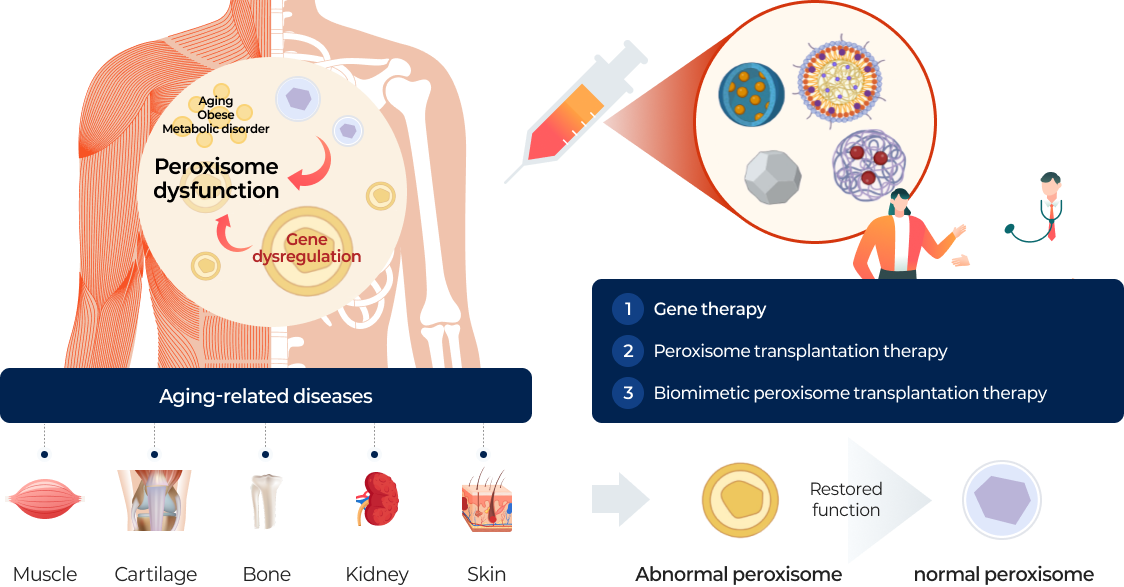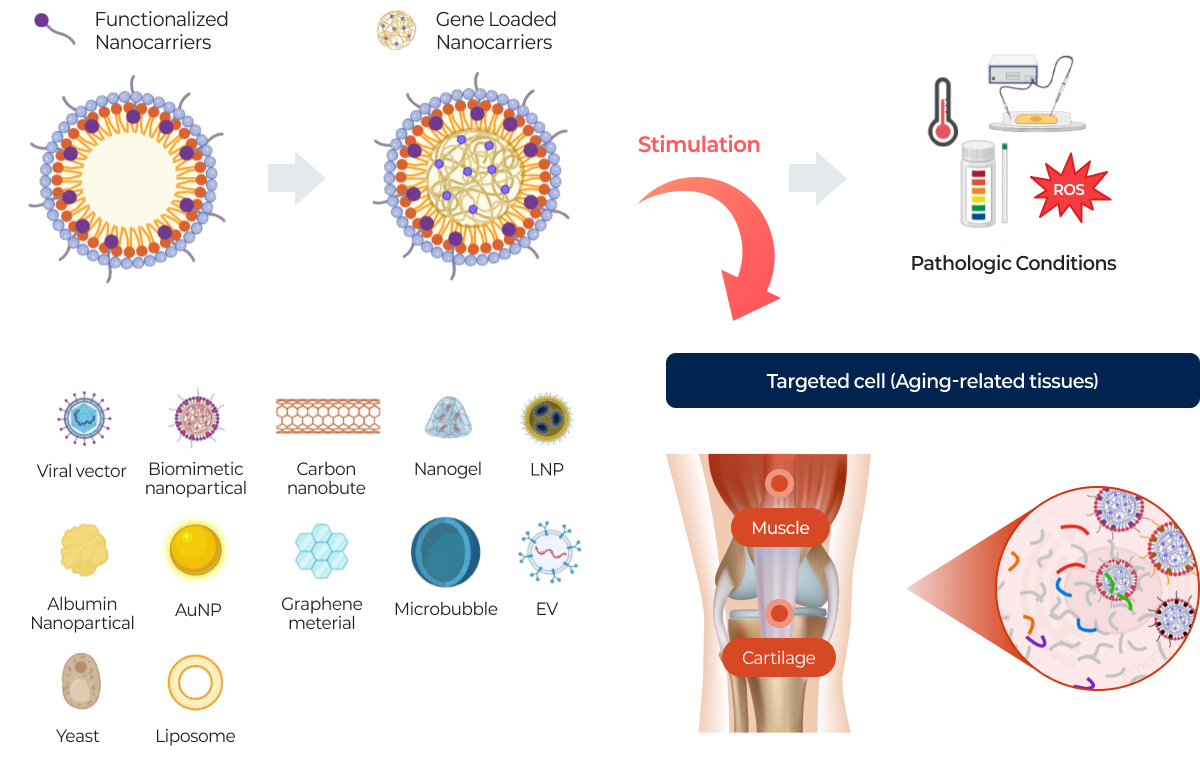Overview
Peroxisome-based Therapy

Peroxisomes are small, membrane-bound organelles found in almost all eukaryotic cells, and they play a vital role in cellular metabolism. Their primary functions include the breakdown of very long-chain fatty acids through beta-oxidation, detoxification of reactive oxygen species (such as hydrogen peroxide) via enzymes like catalase, and the biosynthesis of plasmalogens, which are critical components of cell membranes, particularly in the brain and nervous system. Peroxisomes also participate in cholesterol synthesis and the metabolism of bile acids and lipids.
As the body ages, peroxisomal function tends to decline, contributing to the accumulation of cellular damage. This decline in function can lead to increased oxidative stress and impaired lipid metabolism, both of which are associated with the aging process. Peroxisomal dysfunction can also negatively affect mitochondrial function, as these two organelles work closely together in cellular energy regulation and detoxification processes. The loss of peroxisomal activity thus exacerbates cellular aging and contributes to the development of age-related diseases.
The link between peroxisome dysfunction and aging-related diseases is particularly evident in conditions such as neurodegenerative diseases, metabolic disorders, and cartilage and muscle degeneration. In these diseases, impaired peroxisomal activity leads to an accumulation of toxic metabolites and increased oxidative stress, which accelerates cellular aging and tissue damage.
Peroxisomal Therapies

Organelle Therapeutics, Inc., we are pioneering innovative therapies to address aging-related diseases through the restoration of peroxisomal function. Our therapeutic strategies are focused on combating the cellular dysfunction caused by peroxisome impairment, a key factor in the progression of age-related disorders, obesity, and metabolic imbalances.
Our Peroxisome-Restoring Strategies
- Gene Therapy
This approach targets the genetic root of peroxisome dysfunction by correcting or replacing defective genes that regulate peroxisomal biogenesis and function. By restoring normal gene activity, we aim to rejuvenate peroxisomal processes, which are essential for lipid metabolism and detoxification.
- Peroxisome Transplantation Therapy
In this strategy, healthy and functional peroxisomes are transplanted into cells where peroxisomes are either defective or absent. This method helps restore critical metabolic functions, particularly in tissues such as muscle, cartilage, kidney, skin, and liver, which are heavily affected by peroxisomal deficiencies.
- Biomimetic Peroxisome Transplantation Therapy
This cutting-edge approach involves the development of synthetic, bioinspired peroxisomes designed to replicate the natural functions of peroxisomes. By mimicking these vital cellular organelles, we aim to restore balance in metabolic pathways and reduce oxidative stress, especially in degenerative conditions. Through these innovative therapies, Organelle Therapeutics, Inc. is committed to improving the health and quality of life for patients suffering from the effects of aging-related diseases, while paving the way for breakthroughs in regenerative medicine.
Lentivirus Gene Therapy

Organelle Therapeutics, Inc. we utilizes lentiviral vectors for gene delivery to restore peroxisome function, offering several advantages. Lentiviral vectors can integrate into the host genome, providing long-term expression of therapeutic genes, which is crucial for chronic conditions related to peroxisome dysfunction.
They are highly efficient in transducing both dividing and non-dividing cells, making them versatile for targeting a wide range of tissues, including those with slow cell turnover such as the liver or muscles. Lentiviruses also have a relatively large packaging capacity, allowing them to carry complex genetic material necessary for restoring peroxisome function.
Additionally, they have low immunogenicity, reducing the likelihood of an adverse immune response, which is essential for maintaining the therapy's efficacy over time. These features make lentiviral vectors an ideal choice for gene therapy aimed at correcting peroxisomal disorders and providing a sustained therapeutic effect.
Targeted Drug Delivery Platforms

At Organelle Therapeutics, Inc., we are developing Targeted Drug Delivery Platforms designed to address the limitations of conventional drug delivery methods, such as the need for high doses and low targeting specificity, especially in the context of aging-related diseases.
Traditional delivery systems often require high drug doses to achieve therapeutic effects, which can lead to off-target effects and reduced efficacy. To overcome these challenges, we are advancing targeted delivery technologies that precisely deliver therapeutic agents to the affected tissues, minimizing side effects and maximizing therapeutic outcomes.
Our targeted platforms are designed to specifically deliver drugs to aging-related tissues, such as cartilage and muscle, which are commonly affected by degenerative conditions like osteoarthritis and muscle atrophy. By developing innovative targeted delivery systems, Organelle Therapeutics, Inc. is advancing the next generation of precision therapies that minimize drug dosage while maximizing efficacy and specificity, providing safer and more effective treatments for aging-related diseases.
Cookie Consent Settings
- Essential Cookies
- Functional Cookies
- Marketing/Advertising Cookies
- Analytics Cookies
